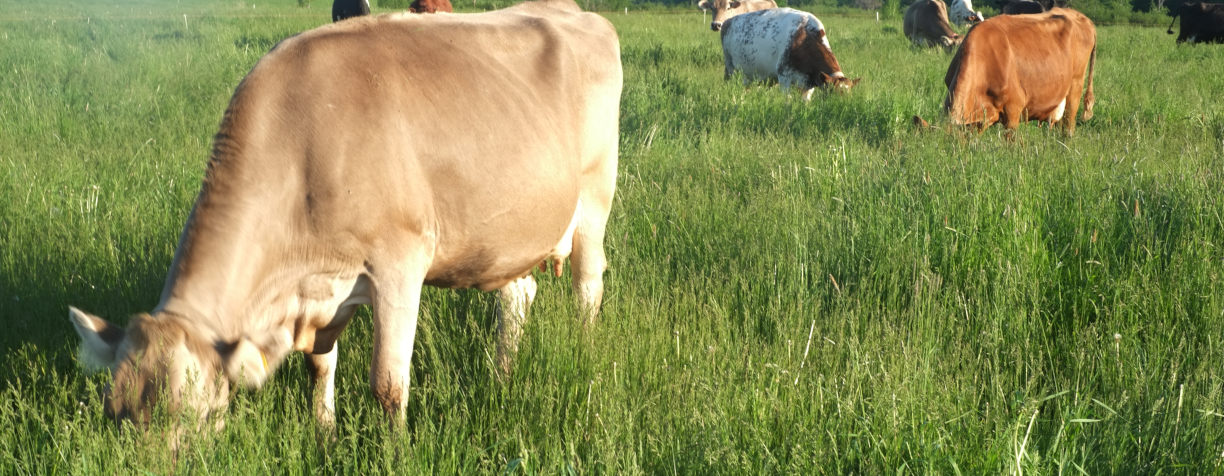Walden Local
Walden Local
Haden Gooch and his partner Katie produce pasture-raised chickens for Walden. They started an ice cream company in Portland, Maine last year to help fund their dream dairy farm and to spread the word about the benefits of grass-based farming.
“We assumed people wanted to sit down with open ears and listen to how we think pasture farming is the best,” said Haden. But what they found was that—on a hot summer’s day on the streets of Portland—it was more about the ice cream. “It was actually nice, though, because it shook our egos a little. We realized this is way harder of an issue than we initially thought, and we have to try a lot harder.”
Like many idealistic, entrepreneurial farmers today, Haden is used to trying hard—and learning on the job. While the 29-year-old Virginia native grew up visiting his grandfather’s beef farm—running through the pastures and having cow patty fights with his cousins—he didn’t work the animals or learn the trade. After high school, when he moved to Oregon to pursue an interest in agriculture, he started from square one. “I’d never say to someone that I grew up on a farm, because I was still very disconnected from it, even though my whole life, it was right in my backyard,” Haden said.
In Oregon, Haden worked a vegetable farm and learned many things—most importantly, that he wasn’t cut out for bending over and planting crops all day. So he moved back to Virginia to work with livestock at Free Union Grass Farm, where he landed an internship. It’s also where Katie and Haden met.
Free Union runs a diversified farm and directly markets its products all over Charlottesville and Richmond. In the two years Haden worked there, Free Union produced approximately 16,000 broilers and ducks, 200 hogs, 60 beef steers, and sold eggs from one thousand laying hens. Haden worked, watched, and learned, gaining experience in the office and the pasture. He even bought a cow—which turned out to be an expensive mistake.
“I had no idea what I was doing, but I knew I wanted to do something within the dairy realm,” Haden said. “So I decided to join DGA, the Dairy Grazing Apprenticeship, and Wolfe’s Neck was one of the host farms.” Haden and Katie traveled to Freeport, Maine, to work at Wolfe’s Neck Center for Agriculture & the Environment, a 60-year-old, sustainable, nonprofit center for innovative practices in regenerative agriculture.
“I was there for three years helping out with all aspects of meat and dairy on the farm,” said Haden. “With my experience from the Free Union Grass Farm, I became the small livestock/meat manager. I got to do a lot of experimental stuff, which was cool.”
It was at Wolfe’s Neck that Haden learned to incorporate technology into farming, and began to notice how others in the industry—from grass-fed farms in New Zealand to the factory farming complex in the US—create efficiency through innovation. New instruments that provide dry matter readings, soil monitors, and even simple things like an egg mobile to transport fresh eggs can help a pasture-based farm increase the bottom line, according to Haden. Finding efficiencies is especially crucial for farmers who pasture raise livestock on a local scale when the broader market is controlled by mega-corporations.
“It’s so hard to convince people who have been buying this chicken for 85 cents a pound that it’s not just about the product itself,” said Haden. “It’s so much more than that. It’s the family behind the product, it’s the company behind the product, and it’s the land behind the product that really is the whole holistic package that you’re supporting.”
The low prices on factory-farmed chicken still shock Haden when he goes to the supermarket—especially since he knows what it costs to produce healthy pasture-raised food. He hopes that by convincing more people to support pasture-based farming, the prices can start coming down as demand increases.
“That’s why we started ice cream—it’s inexpensive and we’re able to reach people from more walks of life, but that’s just ice cream,” said Haden. “People have to eat healthy food, too, and that’s where it gets a little more challenging.”
For Haden, battling challenges would be much harder without the support of Walden members. Especially the unforeseen problems, like the COVID-19 pandemic. “It’s been really cool to continually get the support from Walden, getting emails, saying like, ‘Hey, no matter what happens, we’ll still support you in any way that we can,’” Haden said. And while the pandemic has affected their business, the great tasting chicken that Walden members get in their shares helps Haden and Katie continue farming.
“I just secured the loan to expand our boiler operation,” Haden said. “I’ve never taken out a loan—other than for my truck. This was the most amount of money ever for me.”
Haden and Katie are hard-working young farmers making a difference in New England today.
They understand the challenges and opportunities for modern, local farms and are approaching them with a smart combination of idealism and real-world experience. Here at Walden, we’re excited to see what the future has in store for Haden and Katie and celebrate the unique path they’ve taken to get where they are.
“I wanted to start a company that could address the issues on a broader scale, but I’ve backed away from trying to change the world,” Haden said. “I would rather help the community—that is changing the world. Right?”


